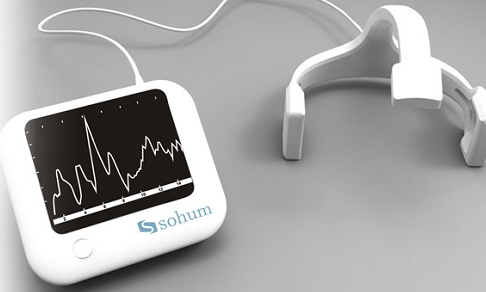An Indian startup develops a low-cost battery-operated, non-invasive device to screen newborn hearing. Sohum is a unique device, which uses brainstem auditory evoked response to check for hearing response in a newborn. The technology is appropriate for the resource constrained settings and aims to cater to nearly 26 million babies born every year in India.
An Indian startup company has developed a low-cost battery-operated, non-invasive device to screen newborn hearing. Sohum is a unique device, which uses brainstem auditory evoked response to check for hearing response in a newborn. The technology is appropriate for the resource constrained settings and aims to cater to nearly 26 million babies born every year in India.
As of now, this technology is prohibitively expensive and inaccessible to many. The Bengaluru-based startup has made the technology appropriate for the resource constrained settings and aims to cater to nearly 26 million babies born every year in India.
The portable device measures auditory brain waves via three electrodes placed on the baby’s head. When stimulated, they detect electrical responses generated by the brain’s auditory system. If there is no response, the child cannot hear. The battery-operated device is non-invasive, which means babies do not need to be sedated, which is the current, and risky, testing process at present.
Another key advantage of this device over other testing systems is the patented, in-built algorithm that filters out ambient noise from the test signal. This is important because health clinics can be incredibly crowded and noisy.
The device has been installed in five clinical centres which are currently running the hearing screening programme. The aim is to screen two percent of hospital-born babies in the first year, before scaling up.
This innovative medical device has been developed with the assistance of Department of Biotechnology, under its flagship Stanford-India Biodesign (SIB) programme, aimed to develop innovative and affordable medical devices for unmet clinical needs of India and to train the next generation of medical technology innovators in the country. It was formally launch by the Minister of State for Science & Technology, Y.S. Chaudhary in New Delhi.
One of the most common birth disorders – congenital hearing loss – is a result of both genetic and non-genetic factors. These factors are mostly associated with resource-poor economies such as India where, unlike advanced healthcare systems, hearing impairment goes undiagnosed. But when it is discovered at 4+ years, it’s too late to reverse the damage and this leads to a host of problems such as impaired communication skills and even possible mental illness; all of which have a deep impact on the child, emotionally and economically life-long.
Globally, 8,00,000 hearing impaired babies are born annually of which, nearly 1,00,000 are in India. And all this preventable damage needs is early screening, which can facilitate timely treatment and rehabilitation.


